Curing Cannabis
Ever had bud that smelled and tasted amazing, with a perfectly smooth finish? How about bud that looked alright but smelled like hay, tasted bad, and was really harsh on your throat? Curing may have been responsible!

We serious cannabis gardeners should be upping our curing game with every crop we grow. Improper or insufficient curing can turn well-grown flowers into bunk! Skilled curing can turn mediocre bud into something really enjoyable. When I harvested my Steem OG plant "Ace", I promised to write a full post on how I cure cannabis. 5 days of drying later, and it's time for that post!
What is curing?
As I said in my post last night, curing happens to cannabis buds as the plant tissues die, as a result of beneficial microbes. As long as the temperature isn't too warm or too cold, and as long as the cannabis doesn't become completely dry, curing will occur. It isn't a step or procedure we do, it's something natural we just need to let happen.
Drying
Dying also happens naturally to dead plants, including cannabis, and can be accomplished many ways. The way I dry cannabis is by hanging the buds (with trichome-coated 'sugar leaves' intact) on their stems, upside-down, in the dark, at room temperature, with low humidity and a bit of air flow. Details here.
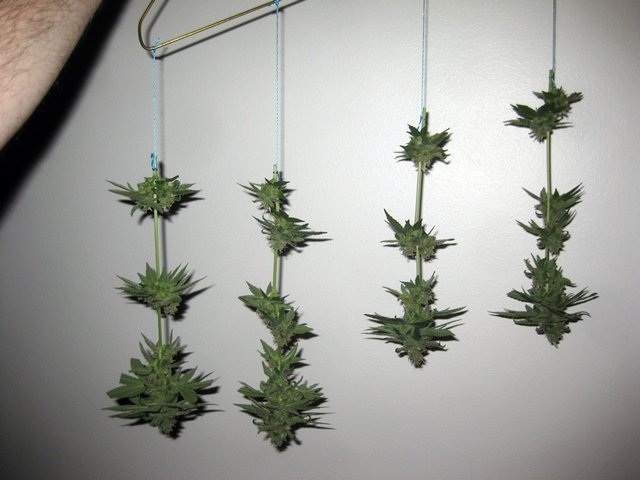
Mold is one of your enemies, and happens when your buds are too wet, not drying quickly enough, and/or too warm. See my recent post on mold for ways to avoid it in your garden area. My no-touch hang dry method is great for reducing chances of mold contamination, but always be cautious of humidity levels. And remember that larger buds need longer to dry, as their center will still be wet when the outside is dry. Bud dries from the outside in.
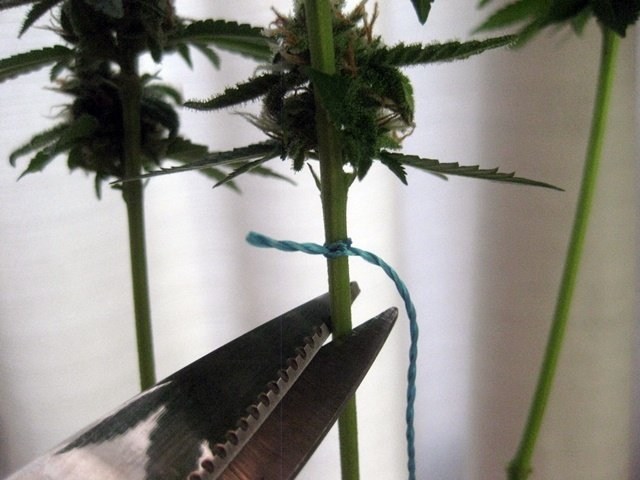
Your other enemy is over-drying. Because curing is a biological process involving microbes and biochemical changes in the plant tissue, it requires water. You need to avoid too much wetness, but if you dry too quickly or too much, the bud won't have much time to cure. Too much air-flow can dry your bud too fast, as can drying it in an area with extremely low humidity. Technically, we're aiming for a final moisture content of about 10%, depending on intended use.
Drying just quickly enough to avoid mold issues, but slowly enough for a good long cure, is what you're striving for! You'll either get there by luck, or by honing your skills over many crops, but once you do you'll understand why a proper cure is vital!
When your buds are drying and curing, you'll smell a hay-like scent being given off. The chlorophyll (which make plants green) and sugars are breaking down, leaving much more pleasant compounds. Curing brings out the terpenes, which give each cannabis strain its distinctive smell, taste, and even medicinal effects. Improperly cured cannabis may look okay, but it often tastes dead, harsh, or like straw. Sometimes insufficiently-cured cannabis still looks very green and fresh (a good thing for spinach, not weed).

Curing "Ace"
Ace, my Steem OG hybrid female bred by @jonyoudyer, had been drying for 4 days and nights when I decided to move her to jars. For small buds like these, I know they've been hanging long enough when the outsides feel dry and crispy, but the stems are still slightly flexible. For larger buds, I like to dry a bit slower, and wait until the stems are dry enough to break.
Glass is the only material I recommend you allow your buds to touch. It's clean, it doesn't break down, it doesn't interact with cannabis (or solvents), it's cheap. An airtight lid is important.

Holding a stem in one hand, I come at the buds with my snips from below, removing the 'sugar leaf' (small trichome-coated leaves).
Trimming is another important step that is usually done around the harvest/drying/curing stages, but I won't go into it much here. I like to remove all non-medicinal leaves (like the fan leaves) at harvest, leaving nothing on the stems to dry except bud and sugar leaf. When the bud is dry enough to jar, I separate off the sugar leaf. It will finish curing within a couple weeks and then get used to make extracts or edibles.

If you know me, you know I won't waste a single one of those delicious cannabinoid-filled trichome heads!
After the trimjob, my Steem OG bud looks gorgeous! Symmetrical even in death. What a beauty she was, and still is!

That's what good genetics can do with nothing but dirt, water, air, and light! One seed yielded a small pile of bud with a budget near $0. The snippers stuck together after the first clip, and the scent coming off this bud is incredible! Everything I smelled during the growing process, plus a whole new layer of complexity. My mouth watered as I trimmed up the buds, which remain completely untouched except by air. They grew in air, were never handled, I harvested them without touching them, and now they'll go into the jars that way too!

Note the green colour still fading as curing progresses. In another week that will be mostly gone, replaced by a tan, golden, or beige look. Cured bud takes on a dry-but-not-brittle feel, flexible due to the resin content.

A hallmark of top shelf bud is that pristine unhandled look of flowers that were cared for properly at every stage.

To avoid over-drying, the buds need to go into jars from now on, which means they need to come off the stems. A glass jar allows your cannabis to continue the drying process, in a slow and controlled manner. This is when the majority of the curing takes place. If you can draw out that drying process to a few weeks, or even a few months, you'll be rewarded with incredibly tasty, smooth, and potent bud.

The no-touch method continues, with buds snipped off right into the jar (laid on its side). Store jars in a cool dark place.
Irradiated weed?
In many places with 'legalized' cannabis, government regulators insist that cannabis be irradiated, much like produce meant for raw consumption, to reduce microbe levels. This has never been shown to be beneficial. In fact, irradiating cannabis burns off the trichome heads, which is where the cannabinoids and terpenes are. This leaves irradiated cannabis lower in potency and flavour. Also, the death of the microbes means curing can't continue. Because of this, a lot of 'legal' weed tastes dull, burns harsh, and has very little medicinal (or recreational) benefit.
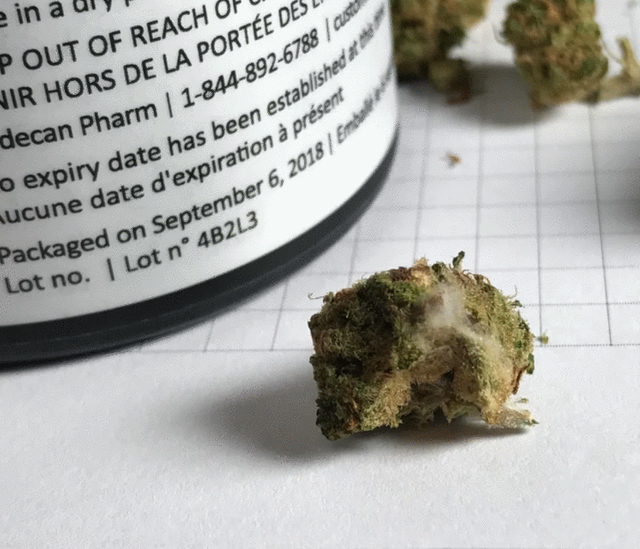
Curing knowledge has been accumulated and passed along by generations of gardeners. Much of it happened during harsh prohibition times (1923-present), putting it within the so-called 'black market'. But this knowledge isn't harmful, or dangerous, or immoral - in any way! Irradiating cannabis shows the grower is either ignorant of the fact that it burns away trichome heads and stops curing, or wants that to happen.
Always try to know your grower. If possible, be your grower.
The jar life
At first, check your jarred cannabis buds often. If there's any condensation on the inside of the jar, your bud is too wet. Leave the lid off until there's no visible dampness (that's a great way to grow mold).
As the buds cure, 'burp' the jars by opening them regularly. At first you'll want to do this every few hours. Smell the gases coming off the plant matter. Curing is breaking down sugars and chlorophyll, giving off a smell you'll come to recognize. (It's a smell you've smelled before, when opening up baggies of bud grown by a questionable source, and it's often passed off as "dankness' or 'freshness'. You won't fall for poorly-cured weed anymore, though!) As your buds cure, you won't need to burp the jars as often, and eventually you'll want to leave them closed to stop any further moisture loss.

Properly cured cannabis - that is jarred in a cool dark place - can retain much of its freshness and potency for up to a year.
You don't have to do things exactly as I do them. I'm just showing you my methods, in case that helps you. The main thing is understanding what curing is - a natural process that needs proper conditions and time. We mainly need to avoid drying so quickly that curing ends early, or drying so slowly that we get mold.
Don't be intimidated if it seems complex, because it actually isn't once you get doing it. You can turn cannabis flowers into exceptional dry bud. All you need is knowledge, patience, and the freedom to grow.
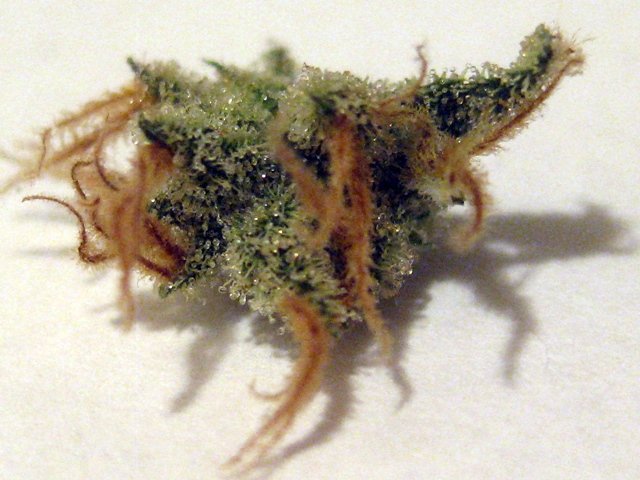
Frosty nugs are only half the story. If you aren't curing properly, you're likely missing out on a lot of potential flavour, quality, and high!
Root issue

The root, having been harvested, washed, and hung to dry like the buds, is now ready to be processed. A quick pass through the grinder yielded a small handful of dry root shavings.

It smells interesting, a bit like fresh carrot. After handling it, I could feel the stickiness of cannabinoids on my fingertips when washing up. There's definitely medicine in these roots! Stay tuned for extraction in a coming post.
Grow (and cure) in peace.
DRutter
PS: For my other post about cannabis and curing, click here!
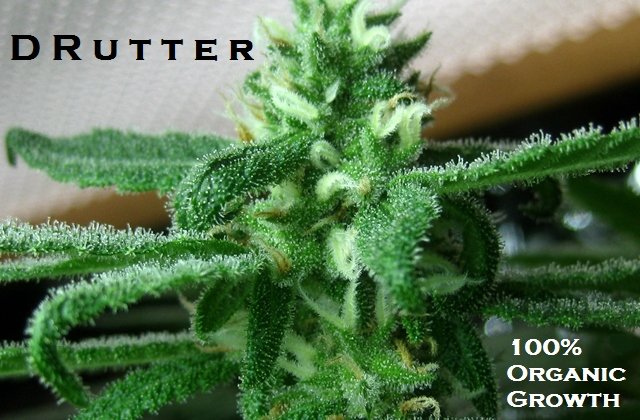
There are so many things to consider - dry not too fast but also don't keep them wet because they will mold. Do this, don't do this.. sounds like a lot of chemistry happening there :) But the results is definitely worth it!
Very informative posts accompanied with great photos..
Thank you for sharing and have a lovely day!
I can't wait to try the roots. We should get into smoothies again and juice some leaves. I'm not very good at the curing process but I like to burp haha.
I wish everyone could have some of that Steem OG bud!
YUM <3
Curing cannabis with cancer...wait oops..curing cancer with cured cannabis hmmmm ;)
I'll resteem this to my hemp-focused followers :D
upvoted.
The cannabis root is in a few ancient medicinal recipes I heard but information is not widely available since prohibition so I don't know too much more about the subject but for sure interested. I saved some of my roots but have not cleaned or processed them yet.
perfect! :)
put this in the great canna-book, fellas! :)
Great explanation of the process.. can wait to see what you do with those roots..
While I could go and gush about how complex this post is and the recent news about cannabinoids and cannabis in general, with all the legal jurisdictions and the economy shifting from black/grey markets to white markets; I rather just skip over that aspect. I will leave a few comments on the post itself before I get to the core of the comment: there's so many things in just one step when dealing with cannabis alone, especially all the annoying factors that go into "curing" cannabis that's been harvested, the steps after and (I think the post touched on this, but I shall comment on it if it hadn't even hinted at it) the varying strains of cannabis alone that potential;y require differing, though micro-changes of, variations of "curing" itself. So, that's something yah get to keep in mind; especially when yah don't forget the larger World Cannabis belongs to: economy, gastronomy (or food culture), agriculture and politics (which should never be forgotten about and how long it took to even get it decriminalized).
But no I want to focus on how this very informational post would be so much better resourced or formatted in a cannabis farmer's farming guide or general book of farming. Imagine these little seeds of knowledge not only spreading but germinating in the minds of both farmers and potential cannabis-lovers/supporters, would help in demystifying the experience of cannabis and how to grow it for farmers and give a newer appreciation to love about cannabis for cannabis-lovers/supporters. Although somethings will need to be reformatted to fit the pages of a stock-standard almanac or farming guide book, this post already could pass with flying colours for what's necessary for a good general/universal understanding of "curing" cannabis which will help guide the person in their application of that knowledge in particular situations. I would imagine that this post would be half-way or three-quarter ways through, especially in the chapters post-cannabis harvest and wanting to start to use cannabis for other things. So definitely a nice thing altogether when high quality posts (good job on the @curie upvote by the way) like these feel like they should be in the books for the future.
Cannabis farmers unite for the Cannabis Farmers Guide!
Zielony (i czerwony) salut!
Green (and red) salute!
Hey just wanted to say that was a good read! Even for a 40 year old grower. Very good writing job and great photos 💯👍👏